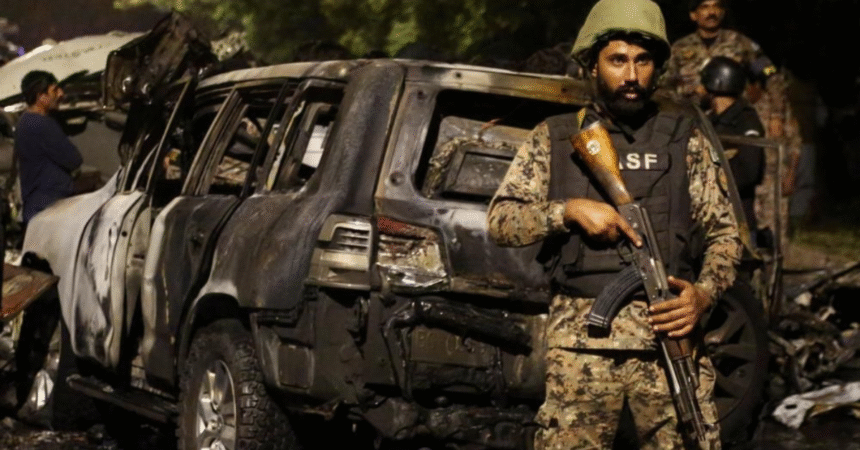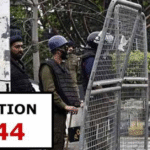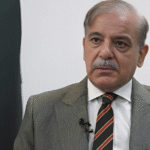In a horrific act of terrorism, a suicide bomber in a vehicle struck a foreign convoy near Karachi’s Jinnah International Airport, leaving devastation in its wake. The attack, which took place near one of the busiest and most secure areas in the city, has shocked the nation and raised concerns over the growing threat of terrorism in Pakistan. This tragic event has not only led to loss of life but has also ignited widespread fear and alarm regarding the safety of foreign personnel in the country.
The suicide attack marks a significant escalation in violence in Karachi, a city that has seen periodic incidents of terrorism despite government efforts to improve security. The explosion has drawn national and international condemnation, as well as calls for stronger measures to combat terrorism.
The Incident: A Devastating Blast
The attack occurred in the early morning hours, during peak travel time, as the foreign convoy was making its way to Karachi’s international airport. Witnesses described the scene as chaotic, with a massive explosion shaking nearby buildings and causing damage to vehicles and infrastructure in the vicinity.
According to preliminary reports, the suicide bomber was driving a vehicle laden with explosives and rammed into the convoy, detonating the bomb upon impact. The explosion was so powerful that it could be heard from several kilometers away, and the debris from the attack littered the surrounding area. Emergency services quickly arrived on the scene, but the damage had already been done.
The targeted convoy was reportedly carrying foreign nationals, including diplomats and officials who were visiting Karachi for undisclosed purposes. Although the exact details of their mission are still unknown, sources suggest that the convoy was heading to the airport for a flight out of the country.
Casualties and Immediate Response
The attack resulted in multiple casualties, both from the foreign convoy and civilians caught in the blast’s proximity. Initial reports indicate that several people have lost their lives, including members of the foreign delegation and Pakistani security personnel tasked with their protection. Dozens more have been injured, many of whom are in critical condition, and they have been rushed to nearby hospitals for emergency treatment.
Among the dead are confirmed Pakistani security personnel who were part of the convoy’s escort team, and while the identities of the foreign victims have not yet been officially disclosed, it is believed that the target was a high-profile diplomatic group. The injured have been taken to the Jinnah Postgraduate Medical Centre (JPMC), where doctors are struggling to cope with the high number of casualties.
The local police and security forces immediately cordoned off the area, setting up checkpoints and increasing security at sensitive installations around the city. The entire airport perimeter has been placed under heavy guard, and additional security forces have been deployed to the site to investigate the attack and ensure no further incidents occur.
Claim of Responsibility
Although no group has officially claimed responsibility for the suicide bombing at the time of writing, the attack bears the hallmarks of previous terror operations conducted by extremist militant organizations in Pakistan. Analysts have pointed to the involvement of groups such as Tehreek-e-Taliban Pakistan (TTP) or other terrorist factions that have been responsible for similar high-profile attacks in recent years.
Terrorist groups in Pakistan have long targeted foreign nationals, diplomats, and government officials in an attempt to destabilize the government and undermine international cooperation with Pakistan. Such attacks are often meticulously planned and aimed at creating widespread panic and fear, both within the country and among foreign powers with ties to Pakistan.
Growing Terrorist Threat in Karachi
Karachi, Pakistan’s largest city and financial hub, has been no stranger to terrorist attacks over the years. Despite the government’s efforts to clamp down on extremism, the city remains a focal point for militant activities due to its strategic importance and diverse population.
Over the past few years, Karachi has experienced a relative decline in violent incidents following security crackdowns, particularly against criminal gangs and militant groups. However, the bombing of the foreign convoy has highlighted the persistent threat of terrorism and raised questions about the city’s preparedness to handle such incidents.
The location of the attack—near Karachi’s international airport—makes the incident particularly alarming. Airports are generally regarded as high-security areas, heavily monitored and protected by law enforcement agencies. For a suicide bomber to get this close to a foreign convoy near such a sensitive area speaks volumes about the level of planning and execution involved in the attack.
International Reactions
The international community has expressed shock and sorrow over the bombing, with several countries issuing statements condemning the attack. Foreign embassies in Islamabad, including those of the United States, the United Kingdom, and European Union member states, have strongly condemned the incident and offered their condolences to the victims and their families.
The attack has prompted many foreign embassies and consulates to review their security protocols for staff stationed in Pakistan. Foreign nationals, particularly those involved in diplomatic missions, are often seen as high-risk targets for terrorist attacks, making it imperative that security measures are constantly upgraded.
Governments of countries with diplomatic personnel in Karachi have also advised their citizens to avoid traveling to the region unless absolutely necessary. Some countries have raised their travel advisories for Pakistan, warning of the potential for further attacks.
Government’s Response and Nationwide Condemnation
In Pakistan, the government’s response to the bombing has been swift and unequivocal. Prime Minister Anwaar-ul-Haq Kakar condemned the attack, calling it an act of cowardice aimed at destabilizing the country and harming its relations with the international community. He vowed to bring those responsible to justice and stated that Pakistan would not be intimidated by such acts of terrorism.
Pakistan’s military and law enforcement agencies have also issued strong statements, emphasizing their commitment to rooting out terrorism from every corner of the country. The bombing has led to a renewed call for enhancing counter-terrorism efforts and improving intelligence-sharing mechanisms between security agencies. The government has also promised to tighten security at sensitive locations, especially in urban centers like Karachi.
Political leaders from across the spectrum have come together to condemn the attack and express solidarity with the victims. There have been calls for a parliamentary session to discuss the ongoing security challenges faced by the country, particularly in cities like Karachi that have historically been hotspots for militant activity.
Impact on Karachi’s Security Landscape
The bombing has sent shockwaves through Karachi, with fears that it could mark the beginning of a new wave of terror attacks targeting the city. Security experts warn that the incident may embolden other militant groups to carry out similar strikes, putting an even greater burden on the city’s law enforcement agencies.
In response to the bombing, Karachi’s police chief has announced heightened security across the city, with additional personnel deployed to guard key installations and public spaces. The airport, government buildings, and foreign consulates have been placed on high alert, with law enforcement agencies increasing their surveillance and patrolling.
Local residents have expressed frustration and concern over the government’s ability to protect them from terrorism. While Karachi has seen improvements in security over recent years, the bombing has shattered the relative calm that the city had been enjoying. Business owners and residents are fearful that further attacks could deter foreign investment and harm the city’s economy, which is already fragile.
Calls for Improved Counter-Terrorism Measures
As investigations into the bombing continue, there is growing pressure on the Pakistani government to adopt more aggressive counter-terrorism measures. Experts have called for enhanced intelligence-gathering and closer coordination between federal and provincial security agencies to preempt future attacks.
There is also a renewed focus on addressing the root causes of terrorism, such as poverty, radicalization, and lack of educational opportunities, particularly in areas where extremist ideologies have taken hold. Counter-terrorism experts have long advocated for a multi-pronged approach that not only involves military and law enforcement action but also addresses the socio-economic conditions that fuel extremism.
The suicide attack near Karachi’s airport has underscored the ongoing challenge of terrorism in Pakistan and highlighted the need for sustained, comprehensive efforts to combat extremism. It has also reaffirmed the importance of international cooperation in fighting terrorism, as foreign nationals and interests remain prime targets for militant groups.
#KarachiAttack #SuicideBomber #BreakingNews #PakistanTerrorAttack #DiplomaticConvoy #JinnahAirport #ForeignNationals #Terrorism In Pakistan #SecurityAlert #Karachi







